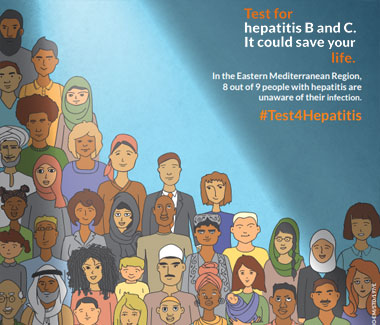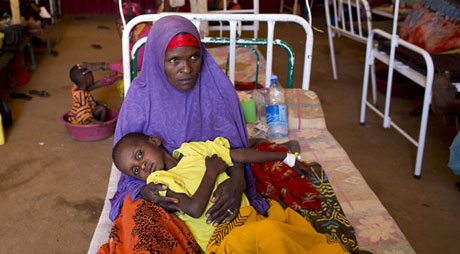National Day for Health Promotion
Baghdad 17 December 2018 – The Iraqi Ministry of Health’s Media and Health Awareness Department, in collaboration with the World Health Organization in Baghdad, celebrated National Day for Health Promotion.
The day was marked with a celebratory event at Baghdad’s Al Zawra Park and attracted a large audience from the Ministry of Health, health and children’s centres in Baghdad, and civil society organizations.
Dr Mohammed Chiad, head of the Media and Health Awareness Department, spoke of the role the media plays in health education, awareness and health promotion.
“The Ministry of Health works through its departments in Baghdad and other governorates to achieve its humanitarian goals,” said Dr Chiad.
The Department uses a wide variety of visual and audio material to encourage people to adopt a healthier lifestyle and abandon habits and behaviour detrimental to their health. The Department’s goals include facilitating access to information, encouraging people to adopt a healthy diet, take up exercise and stop smoking. Meetings and gatherings are held regularly to promote awareness and information sharing.
Dr Ra’ed al-Hashimi, Iraq’s Goodwill Ambassador for Health, stressed the importance of government promoting best practices to eliminate diseases and pollution.
“We are hopeful the United Nations and other international organizations will support the Iraqi people improve health services and promote the health sector,” said Dr al-Hashimi.
The day’s celebrations included an open air exhibition in the park of the services and activities offered by a selection of Baghdad’s health centres and concluded with the recitation of a poem by school student by Retaj Kareem.
Droits d'auteur
© Droits d'auteur - Organisation mondiale de la Santé (OMS), 2023. Tous droits réservés.
L'information reprise sur les diverses pages du site web de l'OMS est mise à disposition du public par l'Organisation mondiale de la Santé. Cette information est protégée par la Convention de Berne sur la Protection des oeuvres littéraires et artistiques, par d'autres conventions internationales et par les législations nationales sur le droit d'auteur et les droits dérivés. De brefs extraits de l'information contenue sur le site web peuvent être librement commentés, reproduits ou traduits à des fins de recherche ou d'étude personnelle, mais ne peuvent être ni vendus ni utilisés à des fins commerciales. Toute utilisation de l'information provenant du site web de l'OMS doit obligatoirement mentionner l'OMS en tant que source de l'information et reprendre l'adresse URL de l'article. La reproduction ou la traduction de portions plus importantes du site web, ou toute utilisation de l'information qu'il contient à des fins autres qu'éducatives ou non commerciales, est subordonnée à l'obtention préalable d'une autorisation écrite formelle. Toute demande de renseignement ou d'autorisation doit être adressée au programme responsable de la page en question.
Les appellations employées dans la présente publication et la présentation des données qui y figurent n’impliquent de la part de l’Organisation mondiale de la Santé aucune prise de position quant au statut juridique des pays, territoires, villes ou zones, ou de leurs autorités, ni quant au tracé de leurs frontières ou limites. Les traits discontinus formés d’une succession de points sur les cartes représentent des frontières approximatives dont le tracé peut ne pas avoir fait l’objet d’un accord définitif.
La mention de firmes et de produits commerciaux ne signifie pas que ces firmes et ces produits commerciaux sont agréés ou recommandés par l’Organisation mondiale de la Santé, de préférence à d’autres de nature analogue. Sauf erreur ou omission, une majuscule initiale indique qu’il s’agit d’un nom déposé.
L’Organisation mondiale de la Santé ne garantit pas que les informations présentées sur ce site Web sont complètes ou correctes et ne saurait être tenue responsable des préjudices subis du fait de son utilisation.
Le fait qu’il existe sur le site Web de l’OMS des liens avec d’autres sites n’indique pas que l’Organisation cautionne ces sites ou accepte une quelconque responsabilité concernant la validité ou l’exactitude des informations qu’ils contiennent.
Media
Nationwide polio vaccination campaign aims to reach over 9.9 million children
Kabul, 5 August 2018 – The Ministry of Public Health in Afghanistan, together with UNICEF and WHO, will launch its third national polio vaccination campaign for 2018. Over the next five days, around 9.9 million children under the age of five will be targeted for vaccination against polio across the country.
However, 1.2 million children from areas inaccessible to vaccination teams will miss the vaccine. These children will not be protected from the polio virus. The main provinces affected are Kandahar (117,640 children), Helmand (541, 839 children), Urozgan (119,406 children) and Zabul (146,513 children). The polio programme continues to look for ways to reach these children to protect them from permanent paralysis due to polio.
The nationwide campaign will be supplemented with vitamin A capsules, given to over 8.9 million children aged between six months to five years. Vitamin A helps to build a child’s immunity and reduces the risk of diarrhea, respiratory infections and measles. Vitamin A supplements can improve a child’s chance of survival by 12 to 24 per cent.
Dr. Ferozuddin Feroz, the Minister of Public Health said: “This campaign is a great opportunity for all parents to vaccinate and protect the children against this paralyzing disease. All families must use this opportunity and make sure that their all children including newborns and sick children are vaccinated. Neglecting in this regard, is indeed a big injustice to the right of children, because the only way for the protection of children from polio, is to vaccinate them in each round of polio vaccination campaigns.”
Except Afghanistan, Pakistan and Nigeria, the poliovirus has been eradicated from all other countries, thanks to the polio vaccine. In 1988, when the Global Polio Eradication Initiative was founded so the world could end polio, there were 350,000 polio cases globally. Today, there are only 13 cases: 10 in Afghanistan and three in Pakistan. In Afghanistan, polio cases are largely in areas where insecurity and misperception about the vaccine creates obstacles for vaccination teams.
“Every child has the right to a healthy life. The polio vaccine protects children from permanent paralysis, which is a serious issue in Afghanistan. I urge every parent to open the door to vaccination teams to ensure their children are safeguarded from a virus that can cause severe disability,” says UNICEF Deputy Representative Stefano Savi. “We believe that Afghanistan can make its people proud and eradicate polio, but this is only possible if every child is vaccinated. We call upon all parties to ensure health workers’ safe, unconditional, and unimpeded access to vaccinate all children.”
The national campaign will be conducted by 70,000 dedicated polio workers who will go to each house vaccinating children. Vaccinators visit each house because people can carry the polio virus, and it can only be eradicated if every child is protected through vaccination. Polio teams will revisit households where children were missed the first time the vaccinators visited to ensure that all children are vaccinated and protected.
“This campaign is a great opportunity for us to take yet another step towards a polio-free Afghanistan,” says WHO Representative for Afghanistan, Dr Richard Peeperkorn. “Although the programme is reaching more children now than ever in past, we know that there is active transmission in some areas of the country. We need to maintain the gains made in population immunity in the pockets where polio still exists to ensure we can end it for good. I call on all Afghans to participate in our joint effort. The last steps are not easy, but they are possible,” he adds.
The polio vaccine is safe and effective and has no side effects. It has been strongly endorsed by prominent local and international Islamic scholars. It is critical to vaccinate all children under five across the country to stop the virus, including all sick children and newborns, whose immunity is weak against this disease.
For more information contact:
Dr Maiwand Ahmadzai
Director, Polio Emergency Operations Centre
+93 79 926 2724





